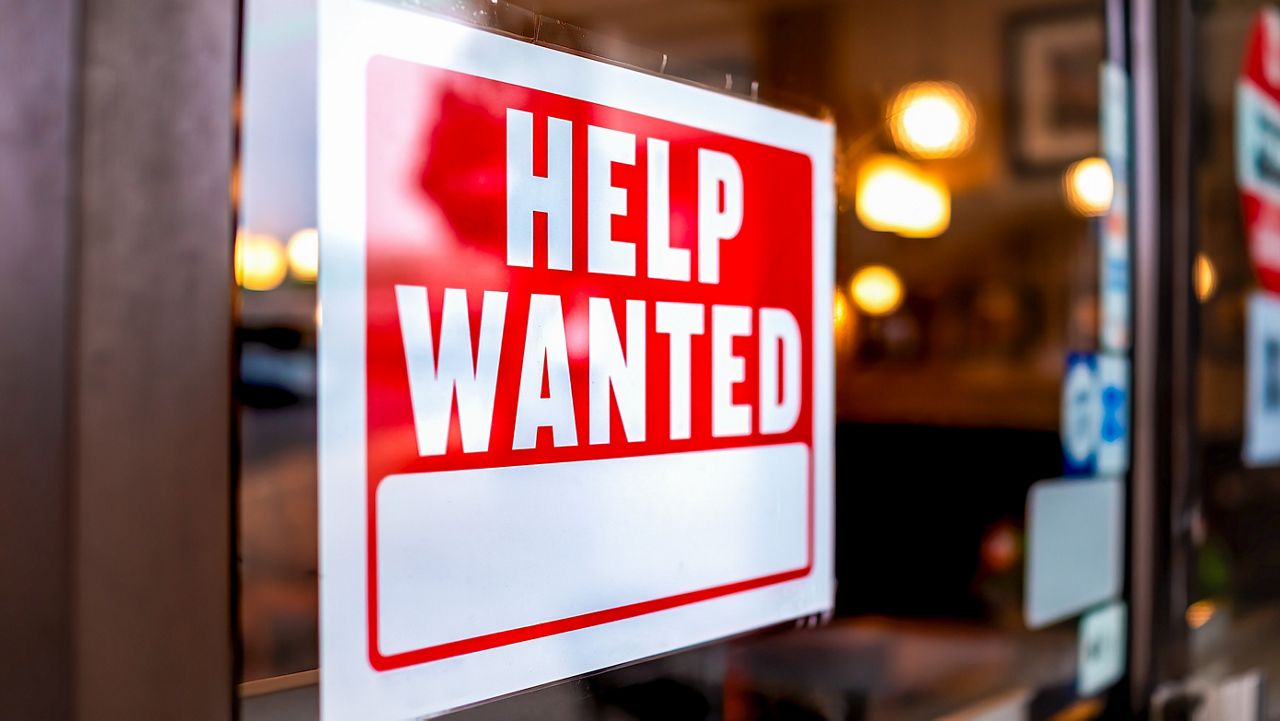LEXINGTON, Ky. — Many Kentucky businesses have difficulty finding workers to fill open positions as the state’s economy begins to recover from the downturn of the yearlong COVID-19 pandemic.
What You Need To Know
- KYCEP's Jason Bailey says employers' complaints are "discredited."
- Kentucky's minimum wage has not increased in more than a decade
- Restaurant workers have had same base pay since 1991
- Companies and businesses are offering incentives to lure employees
A major complaint from employers about the shortage is people are unwilling to work because of unemployment benefits offered through state and federal COVID relief packages. Kentucky Center for Economic Policy Executive Director Jason Bailey in a recent op-ed said that such claims are “discredited.”
“Pay attention, and you’ll notice that such complaints are loudest from companies that offer below-living wages, inadequate benefits and poor workplace flexibility,” he said. “Yet such employers want highly qualified, eager applicants to line up for their jobs.”
Bailey said employers have gotten used to an economy over the last few decades where workers lack the power to bargain for better wages and working conditions.
“That’s happened because of long periods of too few jobs following recessions, a decline in labor unions and a failure to increase the minimum wage — which in our state has been stuck at $7.25 for over a decade,” he said. “While many businesses do provide good jobs, low-quality jobs are also widespread throughout the economy.”
Bailey points out that nearly 40% of jobs pay less than $15 an hour in Kentucky, almost half of all jobs don’t provide health insurance, 70% do not offer retirement benefits, and 38% have no paid sick days.
“That’s at the same time executive pay has soared, and corporate profits are strong,” Bailey said.
Bailey noted the number of complaints among restaurant employees, where wages for tipped workers can be as little as $2.13 an hour in Kentucky — a minimum wage that has not changed since 1991 — and tips are down considerably during the pandemic. Restaurants also have the highest rates of wage theft and on-the-job harassment of any industry, Bailey said.
Bailey also cited a Kentucky business lobby group that stated the “desperation” of employers had forced one restaurant to give a free meal coupon to people filling out an application.
“If the real problem was a shortage of workers, those businesses that really need them would do more than offer a free chicken sandwich — they would raise wages,” he said. “That’s just the way markets work.”
A recent story by Joe Ragusa of Spectrum News 1 detailed incentives some employers offer for new hires, such as Frisch’s Big Boy on Shelbyville Road in Louisville, offering a $250 sign-on bonus for new hires. The owners of Drake’s, a bar and restaurant in Louisville’s St. Matthews neighborhood, offer a $100 bonus if one encourages a friend to apply for a job.
Some businesses are currently offering higher wages and others have announced plans for expanded benefits in the future. McDonald’s recently announced a 10% increase in wages over the next few months to get the average pay up to $15 an hour by 2024. Chipotle announced plans to increase its wages to an average of $15 an hour by the end of June. Amazon announced plans to hire 75,000 people in the U.S. and Canada, including some in Kentucky, with an average wage of $17 per hour and additional signing bonuses.
Not only are wages stagnate in Kentucky, but so are the hours of existing employees, Bailey said.
“Those wanting to keep wages low and politicians stoking resentment about low-wage workers are misleadingly turning their ire to public benefit programs as the cause of unsuccessful hiring efforts,” Bailey said. “But rigorous academic research on expanded unemployment benefits — a lifeline to workers and the economy as a whole during the COVID-19 recession — found little to no impact on the labor market of the extra $600 a week in unemployment benefits that ended in 2020, which has now been cut in half to just $300. Benefits twice as large as those in place today were not found to be a meaningful barrier to employment.”
Vaccinations and federal stimulus legislation will eventually cause wages to begin to rise, Bailey said, adding that will be something to celebrate, not fear, for a Kentucky workforce whose paychecks have been stagnant for most of the past few decades.
“It will mean more families are able to make ends meet, and businesses will benefit from lower turnover and more satisfied employees,” he said. “That’s what the responsible, high-road employers in Kentucky already know. They provide good wages, benefits and working conditions now and have no trouble attracting workers. Let’s not let others off the hook by buying these false narratives and allowing attacks on safety net policies that have proved so essential in this crisis.”
University of Kentucky President Dr. Eli Capilouto announced Friday, May 21, the minimum hourly pay for employees would increase from $12.50 to $13.75 on July 1 and then to $15 beginning Jan. 1, 2022. He also announced new paid leave for part-time regular employees to welcome a new child or care for a sick parent, a 2% merit increase and a one-time $1,000 payment to regular employees.
Southern Glazer’s Wine & Spirits in Lexington is offering a $1,000 hiring incentive for delivery drivers. Company spokesperson Sofia Estevez declined to provide a statement about whether the incentive being offered resulted from a shortage of workers, or if the sign-on bonus had been successful.
This past November, Kentucky state Sen. Reginald Thomas, a Democrat, filed a bill to raise Kentucky’s minimum wage to $15 by 2016 — the rate is currently $7.25 and has been since 2009.
